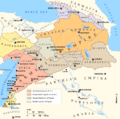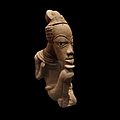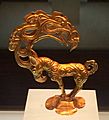Ancient facts for kids
Ancient means something that is very, very old. When we talk about "ancient times" or "ancient history," we're usually thinking about a long period in the past when the first big civilizations started. This time began when people first developed writing, around 5,000 to 5,500 years ago, and it ended with the fall of the Roman Empire in Europe, which was about 1,500 years ago.
This period saw the rise of amazing empires, the invention of important tools and ideas, and the creation of incredible art and buildings that we can still see today. It's a time when many of the foundations for our modern world were laid down.
Contents
What is Ancient History?
Ancient history is the study of human events from the invention of writing up to the start of the Middle Ages. It's a huge period, covering thousands of years and many different parts of the world. During this time, people moved from living in small groups to building large cities and complex societies.
Early Civilizations
The first great civilizations appeared in places where farming was easy, like near big rivers. These early societies learned to grow enough food to support many people. This allowed some people to become builders, thinkers, or leaders instead of just farmers.
Ancient Egypt and Mesopotamia
Two of the earliest and most famous ancient civilizations were Ancient Egypt and Mesopotamia. Mesopotamia, often called the "Cradle of Civilization," was located between the Tigris and Euphrates rivers, in what is now Iraq. Here, people developed the first writing system called cuneiform. They also built the first cities and created early laws.
In Ancient Egypt, along the Nile River, people built huge pyramids and temples. They developed a unique writing system called hieroglyphs. The Egyptians were known for their powerful Pharaohs, their beliefs about the afterlife, and their advanced knowledge of medicine and astronomy.
Powerful Empires: Persia, Greece, and Rome
Later, other powerful empires rose. The Persian Empire was one of the largest, stretching across Asia, Africa, and Europe. They were known for their strong armies and their well-organized government.
The Ancient Greeks were famous for their ideas about democracy, philosophy, and theater. They built beautiful temples like the Parthenon and held the first Olympic Games. Their ideas still influence us today.
The Roman Empire grew to be one of the biggest and most powerful empires in history. The Romans built amazing roads, aqueducts, and buildings. They created a system of laws that influenced many countries. The fall of the Western Roman Empire in 476 AD is often seen as the end of ancient history in Europe.
Civilizations in Asia and Africa
Ancient history wasn't just happening in the Middle East and Europe. In Asia, the Shang Dynasty in China developed early writing on oracle bone script. Later, the Qin Dynasty unified China and built the Great Wall of China. The Han Dynasty followed, expanding China's influence and developing many inventions.
In Africa, beyond Egypt, powerful kingdoms like Nubia (also called Kush) flourished along the Nile. The Kingdom of Aksum in what is now Ethiopia was another important ancient civilization. They developed their own writing and traded across the Red Sea. The Nok culture in West Africa is known for its amazing terracotta sculptures.
The Americas
Even before Europeans arrived, advanced civilizations existed in the Americas. The city of Teotihuacan in Mexico was one of the largest cities in the ancient world, with huge pyramids and a complex urban plan. These civilizations developed unique cultures, art, and scientific knowledge, separate from those in Europe, Asia, and Africa.
Why Study the Ancient World?
Studying ancient history helps us understand where we come from. The inventions, ideas, and ways of life developed by ancient people still affect us today. From our laws and governments to our writing and art, many things we take for granted have roots in the ancient past. It teaches us about human creativity, challenges, and how societies change over time.
Images for kids
-
The Persian Achaemenid Empire at its greatest extent, c. 500 BC
-
Extent of Iranian influence circa 170 BCE, with the Parthian Empire (mostly speaking Western Iranian languages) in red and other areas dominated by Scythia (mostly Eastern Iranian) in orange.
-
Largest expansion of Kingdom of Armenia under Tigranes the Great
-
Khafre's Pyramid (4th dynasty) and Great Sphinx of Giza (c. 2500 BC or perhaps earlier)
-
Pharaohs of Nubia
-
Standing Greek-Buddha, Gandhara, 1st century AD.
-
A political map of the Mauryan Empire, including notable cities, such as the capital Pataliputra, and site of the Buddha's enlightenment.
-
Oracle bone script from the Shang dynasty
-
Terracotta Warriors from the time of Qin Shi Huang
-
The Chinese Han dynasty dominated the East Asia region at the beginning of the first millennium AD
-
Gold stag with eagle's head, and ten more heads in the antlers. Inspired by Siberian Altai mountain art, possibly Pazyryk, unearthed at Nalinggaotu, Shenmu County, near Xi'an, China. Possibly from Huns of the Northern Chinese prairie. 4th to 3rd centuries BC, or Han Dynasty period. Shaanxi History Museum.
-
The ruins of Mesoamerican city Teotihuacan
-
The Age of Migrations in Europe was deeply detrimental to the late Roman Empire.
-
Roman cast terracotta of ram-horned Jupiter Ammon, a form of Zeus, 1st century AD. Gods were sometimes borrowed between civilisations and adapted to local conditions.
See also
 In Spanish: Edad Antigua para niños
In Spanish: Edad Antigua para niños
 | Calvin Brent |
 | Walter T. Bailey |
 | Martha Cassell Thompson |
 | Alberta Jeannette Cassell |



















